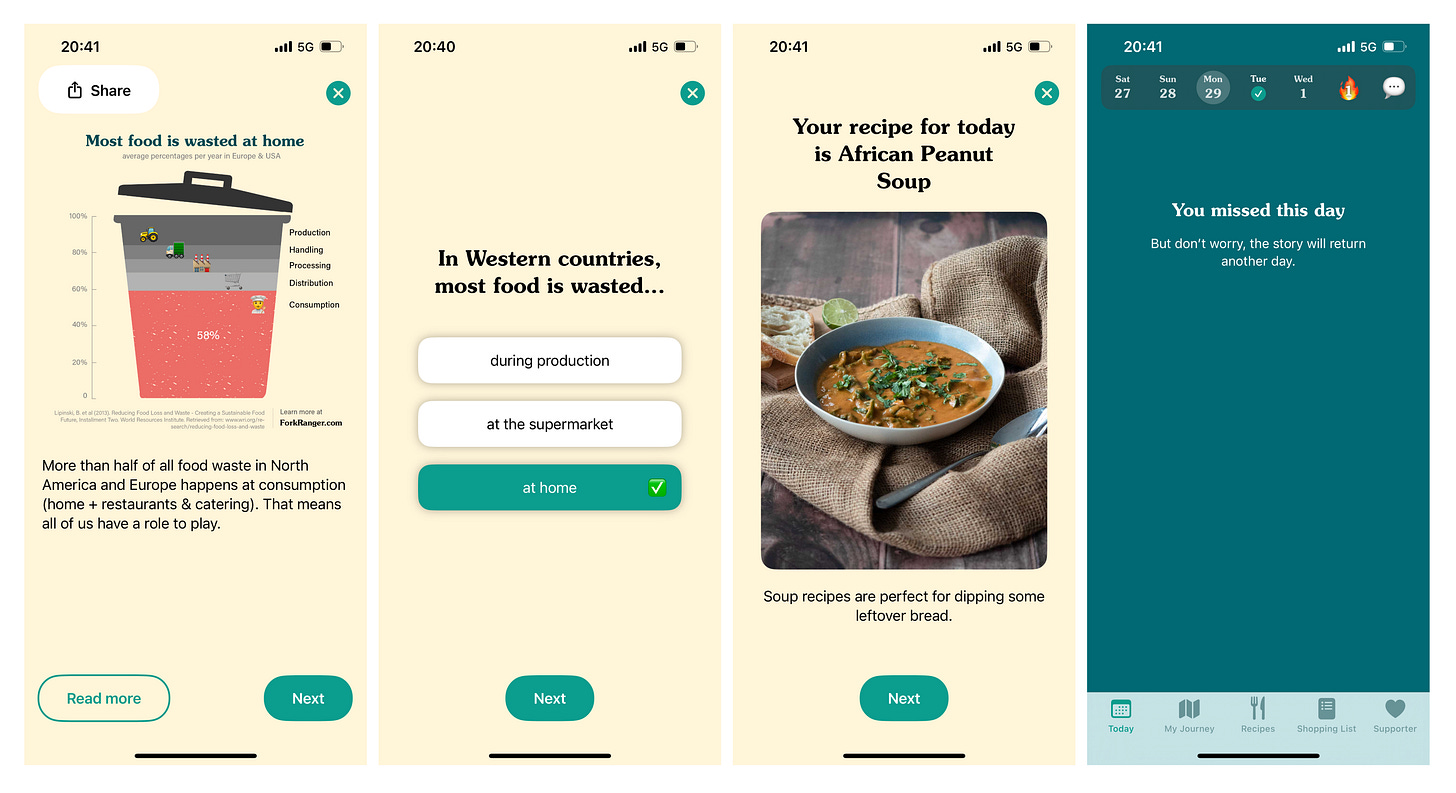We review products based on how well they solve the problem they state they're solving for the people they're stating they're solving it for.
If you are not a subscriber, here’s what you missed so far:
Subscribe for free to receive new posts and support our work.
Today, I'm analysing Fork Ranger, an educational app on the mission to solve climate change with food (thanks to Betti Szabo for telling me about it).
What problem are they trying to solve?
The Fork Ranger team identified that people care about climate science and want to make better choices but lack the tools to do it. The topic is hotly debated, and there is a lot of information on the web, but it is hard to know where to start as a newbie, making it overwhelming and easy to abandon before you've even started.
The Fork Ranger team focuses on the impact food has on the climate with one-third of greenhouse gases being attributed to food. They focus on getting households to make more climate conscious eating choices and start a domino effect of systematic change.
Who is this for?
The app is for people new to climate science who 1) want to learn more about the climate and impact food has on it and, 2) want to learn how to make better climate friendly food choices. Their intent to be part of the solution is already there, and they are ready to take the first step; they don't need convincing why this has urgency now.
Is Fork Ranger solving the problem?
I will analyze it based on the two questions the app wants to answer: 'What can I do about climate change?' and 'What's for dinner?'
What can I do about climate change?
Overall, I'd say Fork Ranger is successful at solving this problem.
At its core, the app is built on the simple mechanism of getting a piece of information a day (daily story) and unlocking easy plant-based recipes to try out. This cycle repeats every day, offering new insights about the food system and climate science. The daily insights are digestible and actionable, as promised, due to data and storytelling in the form of infographics.
The app incorporates several gamification tactics to make the learning journey fun and engaging enough that people stick to it. I will use Yu-kai Chou’s Octalysis framework to identify some tactics:
Empowerment: During the daily content, you take quizzes to test your knowledge, feel involved, and unlock recipes to put your new knowledge into action.
Unpredictability & Curiosity: You learn about new topics daily and might be surprised by the quiz results. The knowledge you gather is presented in the form of a journey where you go through different stages. The first few stages are unlocked, and you get a sneak peek of the next day's topics, but no farther than that.
Social influence: Daily content and quiz results are presented as infographics and are made to be easily shared with others to spark conversations.
Accomplishment & Ownership: You are rewarded with a new recipe every time you learn something new; you get a streak for regularly learning and statistics to see how many days you have completed, recipes made, and infographics or recipes shared.
Loss & avoidance: If you don't come back one day, you lose that day's insights. Although they promise to resurface it at one point later.
While I like the bite-sized format of the daily information, I perceive it as slow and limiting.
It might work for some user types, but what if I wanted to learn at a faster pace or get deeper into one topic? I must wait until the next day to see what daily content I get, so I have 50-50% chances of learning more about the same topic or moving on to something new. What if I'm on a roll and determined to make several small changes at a time? Why is it good for me to wait until the next day?
I see daily constraints as valuable from a business perspective, but is increasing retention artificially really beneficial for users?
What's for dinner?
Here, I'd say they made an attempt, but more is needed to solve the problem successfully.
I love the seasonal information for each recipe, the overview of fruits and veggies available now, and what could be great for storage later. The recipes are plant-based and easy to prepare, and I can filter recipes to use seasonal ingredients. However, their number is limited, so I quickly run out of dinner options.
It's also hard to understand the connection between daily insight (Why food has such a high footprint) and the recipe I unlocked after completing it (Minty aubergine wraps).
Conclusion
The Fork Ranger team certainly found a problem worth solving for and delivered a fairly successful first version that intertwines climate awareness with food exploration. However, more is required to say they have successfully solved the problem. They need to offer more tools to fully deliver on their purpose and enable people to make smarter choices that positively impact the climate.
Keeping the bite-sized format, they could give users who want to advance faster the ability to unlock more content faster. To extend the daily content functionality, they could re-use quizzes from the daily insights and show them later to check how well users retained them and offer additional insights if they miss the correct answer several times.
They could double down on the seasonality functionality to promote recipes that use fruits and vegetables currently available and even let people import their recipes that the app could verify to ensure are climate-friendly; if not, provide substitutes to make them more environmentally friendly.






apart from the article itself, I must say that I really enjoy the timing of it - my Sunday morning quality read.
Thanks for your work Dalma and Radu!
"Why is it good for me to wait until the next day?"
Good point!